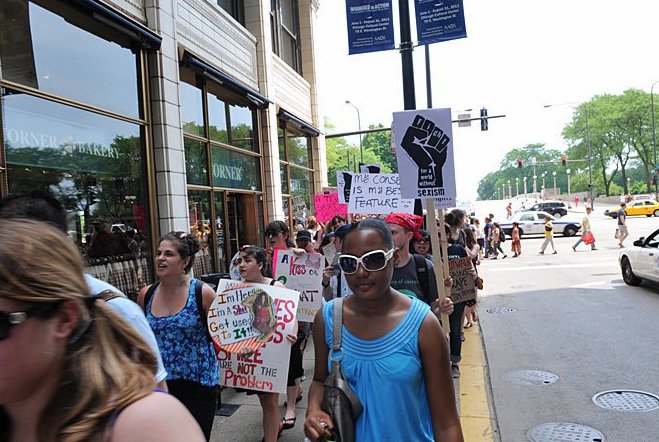One afternoon last September, I took a lunch break from work and walked to the grocery store for a Red Bull and some Q-tips. The store was a short walk from my office and this errand shouldn’t have taken me more than twenty minutes. However, what was supposed to be a simple errand ended up being way more complicated than I expected.
As I walked down the sidewalk on Western Avenue, I saw a group of five or six men wearing safety vests walking towards me. I told myself they were on their way to work, just going about their day like I was, and I was hoping they would walk right past me without saying a word. But deep down inside I was worried that they would hassle me as we crossed paths.
My fear came true. The men began catcalling call me, saying, “Hey, baby.” I told them to be quiet and that I didn’t appreciate being spoken to that way, which then escalated into a shouting match. In their eyes I went from being a “babe” to a bitch. Afterwards, a woman who witnessed the incident while waiting for the bus asked me if I was okay. She said that when she had previously seen those men, she had crossed the street to avoid them. She suggested that I start carrying pepper spray or a knife for my own safety.
This scenario wasn’t anything new for me. There have been multiple situations where after I was catcalled and stood up for myself, the perpetrator got offended that I didn’t accept his advances, which usually led to an argument. On other occasions, I’ve tried to ignore the comments and keep walking, but the harassers still got angry because I didn’t respond to their come-ons. I’ve been called every derogatory term imaginable for women, followed home by angry men, and threatened with beatings and rape.
Luckily none of these incidents escalated into actual attacks, but with these kind of encounters there’s always the possibility that my physical safety will be threatened. I’ve learned to pick and choose my battles, but that can get exhausting. These encounters represent a challenge to my right to travel safely and freely through public space, and that's a mobility issue.
Many women (both cisgender and transgender) around the world deal with the fear and reality of street harassment and sexual violence on a daily basis. Threats ranging from unwanted sexual remarks to sexual assault and rape can happen in any public space ay any time of day, whether you’re walking, biking, or taking public transit.
To combat this issue on trains and buses, the CTA recently expanded on its Anti-Harassment Campaign by encouraging people who are victims or witnesses of harassment to report the incidents. According to the CTA, episodes of sexual harassment often go unreported -- they received only 36 reports in all of 2014, but there was probably a much larger number that weren’t reported. While raising awareness about sexual harassment is important, it still doesn’t directly curb the behavior of the perpetrators.
It’s important to remember is that street harassment is fundamentally about power and control. What many men are willing to excuse as harmless flirtation or locker-room talk isn’t taken lightly by those who are on the receiving end of the comments. Time and time again, I hear upsetting stories from my friends about being objectified when they were just trying to get through their day unscathed. Street harassment is so ingrained in our culture that it’s commonly believed that women are the ones who should have to adjust their behavior and take precautions to avoid being victimized.
The well-meaning advice from the woman who witnessed my run-in on Western Avenue really got me thinking. Defensive measures, whether it’s dressing less “sexy” or carrying a weapon, may feel necessary to some people, because street harassment is a reality that women currently have to deal with on a daily basis. But we shouldn’t accept this damaging status quo.
As a society, we need to treat sexual harassment and violence as a top priority, by educating the public that this behavior will not be tolerated, and by holding the perpetrators accountable for their actions. No one should have to live in a constant state of fear that something bad could happen to them while traveling on the public way.
Did you appreciate this article? Please consider making a donation to Streetsblog Chicago to help keep the site running.






